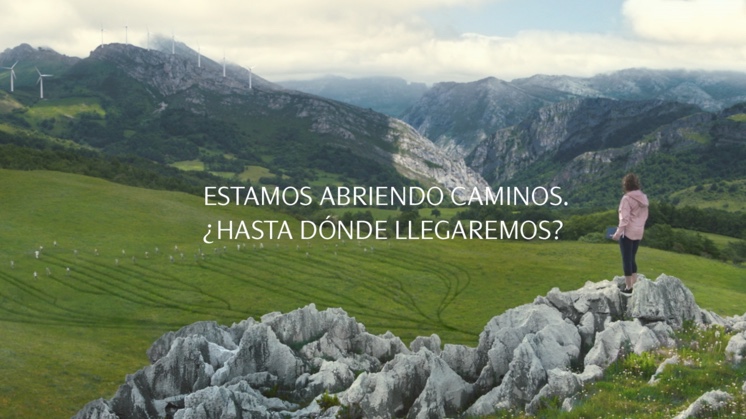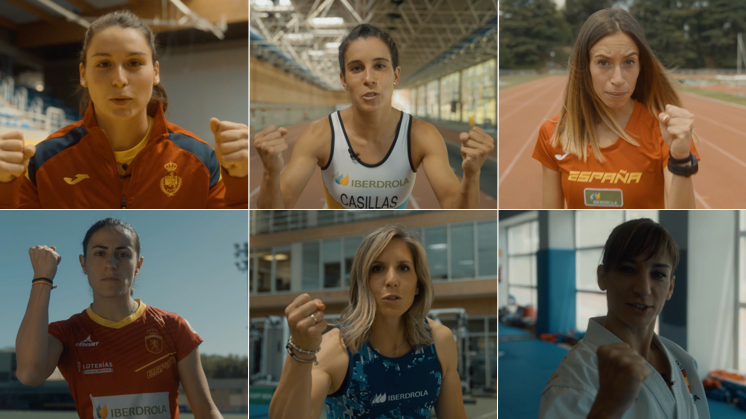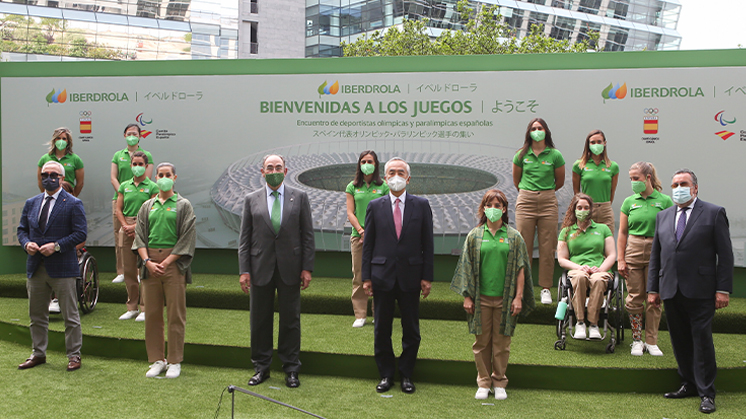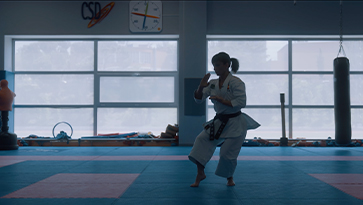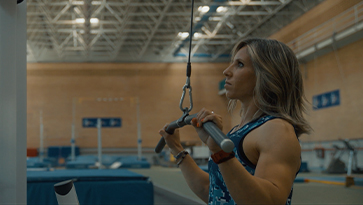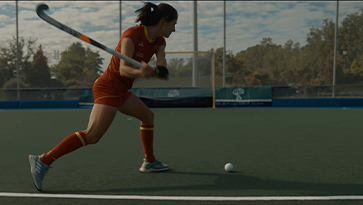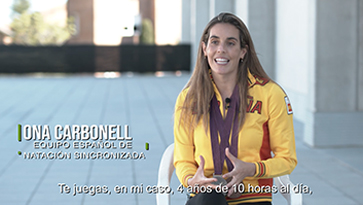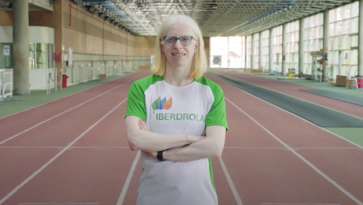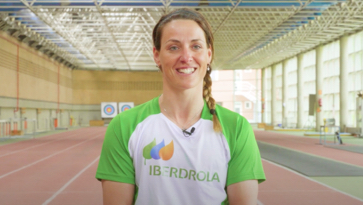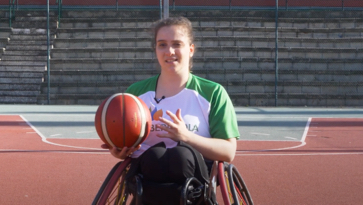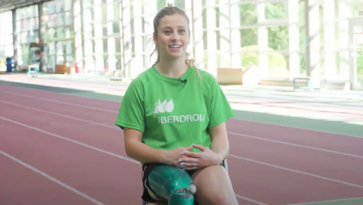Iberdrola, supporting the Tokyo 2020 Olympic and Paralympic Games
All our energy with the Olympic and Paralympic athletes
The Tokyo Olympics were held from 23 July to 8 August 2021, after a one-year delay due to the pandemic. Meanwhile, the Paralympic Games took place 15 days later: from 25 August to 5 September. Iberdrola, which has been promoting Spanish sport for more than two decades, is now supporting the Olympic athletes in their race to Paris 2024.
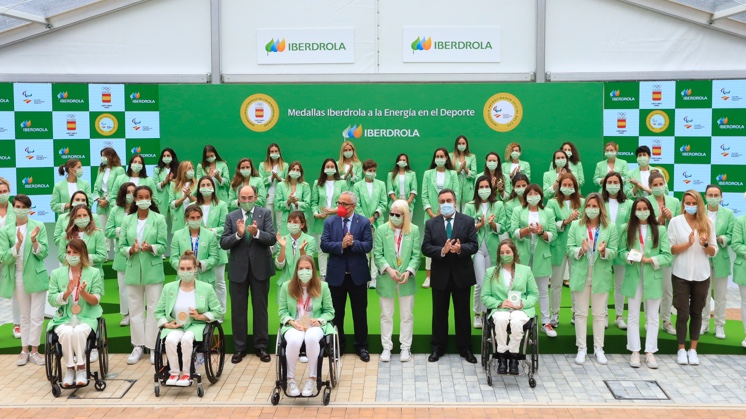
Carmen Valero, the first Spanish female athlete to participate in the Olympic Games, paved the way for many other sportswomen who have followed in her footsteps at the Olympics. In the same way, Iberdrola, Equality Partner of the Spanish Olympic Committee, is paving the way to equality through sport.
It seemed a long way off after the one-year delay due to the pandemic, but at last, the Olympic and Paralympic Games are here. This is everyone's dream.
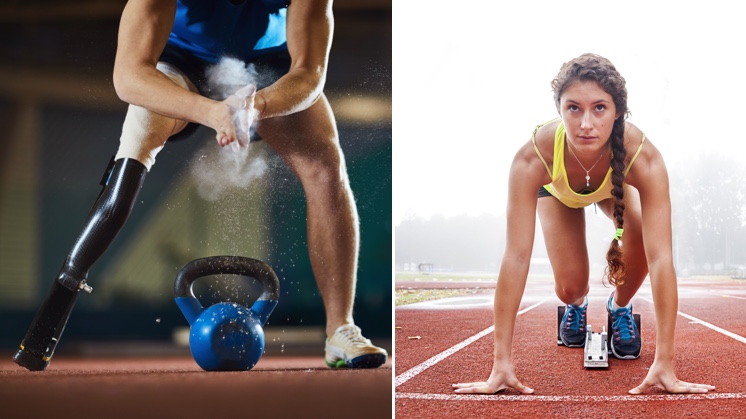
More than two decades ago, Iberdrola paved the way towards clean energy and took the first steps towards a more sustainable and responsible energy model. Similarly, the company was a pioneer in promoting sport as a vehicle for advancing equality, one of its core values. Today, Iberdrola is an Equality Partner of the Spanish Olympic Committee and supports Olympic and Paralympic.
Acknowledgement
For this reason, the group's chairman, Ignacio Galán, also announced their support for the 2024 Paris Games at a ceremony at Iberdrola's headquarters where the Iberdrola Medal for Energy in Sport was awarded to 48 female athletes who represented Spain at the Tokyo 2020 Olympic and Paralympic Games. This recognition aims to highlight the sporting successes achieved and, above all, the effort, determination to succeed and professionalism they displayed at an edition of the games affected by the difficult COVID-19 context.
Galán was accompanied by the chairmen of the Spanish Olympic Committee, Alejandro Blanco, and Spanish Paralympic Committee, Miguel Carballeda.
Among the award winners were medallists such as karate player Sandra Sánchez, 17-year-old taekwondist Adriana Cerezo and canoeists Teresa Portela and Maialen Chorraut, as well as triathletes Eva Moral and Susana Rodríguez, swimmer Marta Fernández and athlete Sara Martínez.
Also present were the members of the hockey team, and a representation of the national handball, wheelchair basketball and artistic gymnastics teams.
Together to the podium
During the Tokyo Olympic Games, Iberdrola launched a new programme, Together to the Podium External link, opens in new window., to support and give visibility to female athletes during the Tokyo Olympic Games.
External link, opens in new window., to support and give visibility to female athletes during the Tokyo Olympic Games.
It is a ten-part series focusing on the role of women in sport, hosted by journalist Sara Giménez León: Great Olympic successes, Overcoming barriers in sport, Visibility of sportswomen, Sustainability in sport, Future Olympians, Management and techniques, Beginnings in sport, Adapted sport, Sport and motherhood and Future of Spanish sport.
The programme was recorded in the radio studio the company set up in Casa España, at the Spanish Olympic Committee's headquarters in Madrid.
Receptions for the olympians
On 26 May, the chairman of Iberdrola group, Ignacio Galán, accompanied by the ambassador of Japan, Hiramatsu Kenji; the president of the Spanish Olympic Committee, Alejandro Blanco, and the president of the Spanish Paralympic Committee, Miguel Carballeda, welcomed eleven athletes who would represent Spain at the Games.
Carolina Marín, Sandra Sánchez, Miriam Casillas, Loida Zabala, Elisabet Cesáreo, Beatriz Pérez, Teresa Portela, María Xao, Desirée Vila, Eva del Moral and Laura García Caro also took part in the lighting of the Light of Iberdrola, a symbol of the company's commitment with Olympism and equal opportunities.
The chairman of Iberdrola, Ignacio Galán, accompanied by the Japanese ambassador, Hiramatsu Kenji; the president of the Spanish Olympic Committee, Alejandro Blanco, and the president of the Spanish Paralympic Committee, Miguel Carballeda, welcomed eleven Spanish athletes before their departure to the Tokyo 2020 Olympic and Paralympic Games.
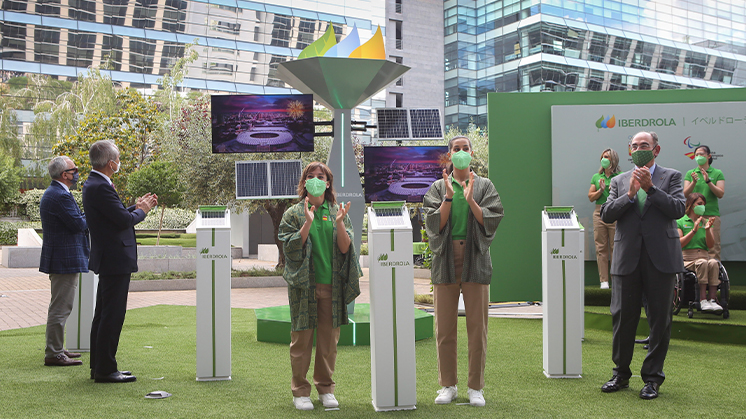
Olympic Games
These were the second Games held in the Japanese capital, which previously hosted them back in 1964, and featured five new sports — climbing, baseball/softball, karate, skateboarding and surfing — and 15 new disciplines, with the aim of increasing women's participation, in line with Sustainable Development Goal 5 (Gender Equality).
The Spanish team, made up of 321 athletes, returned home with 17 medals —same number as in Rio 2016 — and 42 diplomas — the highest number since Athens 2004, in a Games in which 11,711 athletes — 48.8 % women — from 204 countries took part.
-
"A rollercoaster of emotions"
-
"The disappointment was enormous because there were four months to go"
-
"All that excitement about the Games vanishes"
-
"You put four years' work on the line in three minutes"
-
"A rollercoaster of emotions"
-
"The disappointment was enormous because there were four months to go"
-
"All that excitement about the Games vanishes"
-
"You put four years' work on the line in three minutes"
The flag bearers for Spain were, for the first time, two athletes — one woman and one man —: swimmer Mireia Belmonte and canoeist Saúl Craviotto. Athletes — more than 11,000 of them — delegates, referees and judges attended the event vaccinated against COVID-19.
Also for the first time in history, the Olympic torch was lit with hydrogen, as a sign of Japan's commitment to a sustainable future for all.
Paralympic Games
The Paralympic Games, for their part, brought together more than 4,400 athletes — 40.5% of whom were women, a record number — from 162 delegations with physical, intellectual or visual disabilities or cerebral palsy. Athletes took part in 540 events in 22 sports. Badminton and taekwondo were new additions to the programme — sailing and football were out.
The 142 Spanish representatives won 36 medals and 131 diplomas and swimmer Marta Fernández was the flag bearer.
The first official version of these games was held in 1960 in Rome, although their origins go back in 1948. That year, the Olympics were held in London and Sir Ludwig Guttman, a German doctor who had fled Nazi Germany and was working at Stoke Mandeville hospital in England, organised an archery contest for World War II veterans who he was treating for spinal cord injuries. By 1952, this had become an international competition and by 1960 it was held in the same country as the Olympic Games and was no longer restricted to war veterans.
Since 1988, when the games were hosted in Seoul (South Korea), they have been held right after the Olympic Games and on the same site. The International Paralympic Committee (IPC) and the International Olympic Committee (IOC) agreed in 2000 to make the decision official and work towards making the games more inclusive.
Although the term 'Paralympic' originally referred to people with paraplegia, these days it is interpreted as 'Parallel Olympic Games', and it is intended that they be held jointly with the Olympic Games.
-
Susana Rodríguez, Paralympic triathlete
-
Eva Moral, Paralympic triathlete
-
Sara Revuelta, Paralympic basketball player
-
Desirée Vila, Paralympic athlete
-
Susana Rodríguez, Paralympic triathlete
-
Eva Moral, Paralympic triathlete
-
Sara Revuelta, Paralympic basketball player
-
Desirée Vila, Paralympic athlete
Iberdrola, 20 years supporting spanish sport
Iberdrola has been supporting Spanish sport for more than two decades through global agreements with the Spanish Higher Sports Council (Consejo Superior de Deportes - CSD) and the Spanish Olympic and Paralympic Committees (COE and CPE), as well as with various sports federations.
This support has earned it the Gold Plaque of the Royal Order of Sporting Merit, the highest distinction awarded to sport in Spain, and the Stadium Cup for its special contribution to the promotion of sport through actions such as its collaboration with the Universo Mujer programme.
The company sponsors the Spanish Paralympic Team through the Paralympic Objective Sport Support (ADOP) Plan — an initiative of the Paralympic Committee — since its creation in 2005. It also awards annual university scholarships to Paralympic athletes, with the aim of improving their professional preparation.
The company has also reiterated its commitment to the future of athletes by launching, in collaboration with COE, a new edition of the training programme for athletes in finance, economics and law.
We promote the participation of women in sport
In 2016 Iberdrola became the first company to make a firm global commitment to equality and empowerment for women through sport. Through its support for the CSD's Universo Mujer programme, it sponsors 16 women's sports federations: gymnastics, triathlon, rugby, canoeing, badminton, football, handball, volleyball, hockey, table tennis, athletics, karate, boxing, surfing, ice sports and fencing.
Thirteen athletes from these federations — Carolina Marín, Sandra Sánchez, Maialen Chourraut, Nuria Vilarrubia, Teresa Portela, Maria Xiao, Miriam Casillas, Lili Fernández and Elsa Baquerizo — have already secured a place at the Tokyo Games, as have three national teams: handball, artistic gymnastics and hockey.
Iberdrola, backing sport
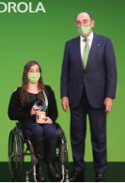
We promote Paralympic sport
We collaborate with the ADOP to provide Spanish Paralympians with the best conditions for their participation in the Games with guaranteed success.
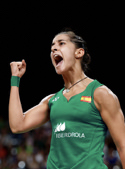
We support sports stars
We were the first company to make a global commitment to promoting the participation of women in sport under the same conditions as men.
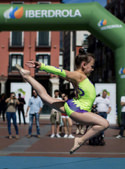
Women's Universe Tour
Its aim is to transmit the ideas of effort and self-improvement through sport, as well as to become a loudspeaker for the successes of Spanish sportswomen.

Iberdrola Supera Awards
They recognise and give visibility to the best initiatives launched in Spain in favour of equality and the empowerment of women through sport.

Sustainable sport
Do you know how much pollution a marathon causes? What about a big event like the football World Cup? Certain sporting activities also damage the environment and it is important to know this.
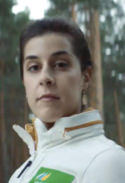
Objective: Equality
We launched this campaign highlighting the values we share with sport: teamwork, effort, tenacity and self-improvement.
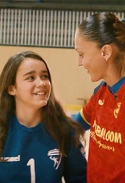
Future is in You
Ambassadors of the Universo Mujer programme share a day of training with a young girl from their discipline. Care to join us?
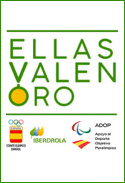
They are worth gold
Records, milestones and stories of the stars of Spanish women's sport on their way to Tokyo.

Let them train you
In this programme, created during lockdown, two elite sportswomen train each other, and viewers, from home.
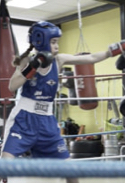
Stories with a soul
Careers forged with passion, effort and a desire to excel that have taken them to the top.





